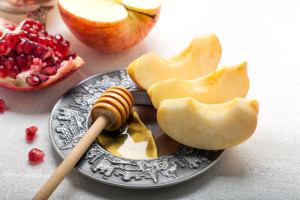
Rosh Hashanah is a celebration of the Jewish New Year and literally translated means “Head of the Year.” It commemorates the creation of Adam and Eve, the first man and woman. The date varies from year to year but always falls in September or October, and it takes place over a two-day period starting on Rosh Hashanah Eve. In 2015, it begins at sunset on September 13 and ends at nightfall on September 14.
Religious Significance
While Rosh Hashanah is a time to celebrate, it also has special religious significance; it is the Day of Judgement for Jews. God is believed to determine the fate of each person for the upcoming year on Rosh Hashanah and writes it in the Book of Life or Book of Death. On Yom Kippur, which begins approximately one week after Rosh Hashanah, the final judgement is known. Another important aspect of Rosh Hashanah is for Jews to contemplate their actions of the previous year and ask for forgiveness for their sins. The end goal is to influence God’s final verdict.
Jews believe that all people are essentially good, but imperfect and commit transgressions. During Rosh Hashanah, they must try to rectify their sins and seek absolution.
Customs
There are a number of customs associated Rosh Hashanah.
- Blowing the shofar
The shofar is horn-shaped musical instrument usually made from a hollowed-out ram’s horn. It is blown a total of 100 times over the course of the holiday, in a combination of long and short blasts.
- Food
- Apples and honey
Apples dipped in honey are traditionally consumed on Rosh Hashanah. Honey was a common sweetener in Biblical times and is referenced frequently in the scriptures. Israel is often referred to as the “land of milk and honey.” This dish is also symbolic of the hope for a sweet year filled with blessings.
- Round Challah
Another food typically eaten during this holiday is round challah. Challah is braided egg bread. During Rosh Hashanah, it is molded in spirals representing the continuity of Creation. Raisins and honey are sometimes mixed into the dough to make it a truly special treat.
- Fish
The words Rosh Hashanah mean “Head of the Year.” Due to the translation, it is customary for some Jews to eat the head of a fish at a special holiday meal.
- New Fruit
New fruit, which is a fruit that has recently come into season, is another traditional food. Pomegranates are often served.
- Tashlich
Tashlich, also called “casting off,” is another Rosh Hashanah tradition. It involves walking through a moving body of water like a river or creek, saying prayers and contemplating discretions committed during the past year. These actions are a symbolic way to “cast off” old sins into the water.
Other Important Jewish Holidays
Rosh Hashanah is one of several significant Jewish holidays. Others include:
- Yom Kippur
In Judaism, Yom Kippur is the holiest day of the year and is called the Day of Atonement. Even Jews who don’t regularly go to temple will participate in traditional observances of this holiday. During Yom Kippur, Jews fast for many hours and spend a lot of time in prayer at synagogues. The holiday comes right after Rosh Hashanah, and the two are closely intertwined. The ten day period beginning with Rosh Hashanah and ending with Yom Kippur are referred to as the Days of Atonement and are a time for thoughtful self-examination. In 2015, Yom Kippur begins on the eve of September 22 and ends at nightfall on September 23.
- Hanukkah
Hanukkah occurs over ten days in December. It is also called the Festival of Lights, which is attributed to the customary lighting of the menorah. A menorah is a candelabrum with nine prongs, and one prong is lit each night of the holiday.
Rosh Hashanah is a very meaningful holiday in Judaism and is celebrated far and wide with a variety of customs.

